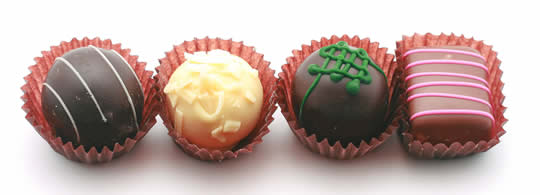The Truffle Strategy: Tempt Your Customers
Could eating a chocolate treat make you want to buy a TV or a cruise? The surprising answer is YES!
At a mall I used to frequent, there was a candy kiosk that always offered a sample chocolate to each passerby. I wondered about the economics of that practice – it seemed that almost everyone grabbed the treat and kept on walking – but I assumed that it must be profitable. In fact, there’s research that shows tempting an individual and getting him to indulge will actually increase his desire to keep indulging. Even more surprising, the desire to indulge goes far beyond having another piece of candy and extends to high-priced consumer items like fancy computers and designer shirts!
Researchers Julio Laran of Miami University and Chris Janiszewski of the University of Florida offered subjects a chocolate truffle and encouraged them to eat it. The subjects who indulged were eager to keep indulging:
If the goal of indulging was activated by eating the sweet, participants tended to keep pursuing that goal (of indulgence) until they felt it was met by eating more and more truffles. The participants also showed a preference for fattier foods (ice cream, pizza, and chips) versus healthier foods (a salad, apple, and granola bar)… [From University of Miami.]
The startling finding was that this desire to indulge encompassed much more than tasty treats:
In one experiment, those who enjoyed the first truffle also valued non-food consumer luxuries, such as Apple computers, designer shirts, high-end TVs and cruises as compared with those who resisted the truffles.
There were a few other relevant findings. First, if the subjects continued to consume truffles until satisfied, the desire to indulge turned off. Second, those individuals who resisted the truffle also seemed to become more virtuous in their attempts to avoid self-indulgence.
The Truffle Strategy
Should you tempt your customers with some kind of indulgent treat? The neuromarketing takeaway from this study is that if you sell a product that might be considered an indulgence – e.g., a premium or luxury item, or a product that people want but don’t need – the truffle strategy might work. But, don’t keep feeding them treats or their desire to indulge themselves will fade. And be aware that those customers who resist the temptation may actually become harder to sell to.
Thinking back to the chocolate kiosk in the mall, I wonder now if the mall operator or surrounding merchants should have subsidized the free chocolates. The delivery mechanism was just about perfect – the clerk offered each passerby one sample, so there was no opportunity for a sweet-toothed customer to grab a handful. The samples were small enough that just about everyone who accepted one wanted more. (No doubt that was the chocolatier’s strategy.) But, according to these findings, each customer who accepted and ate one of the tasty morsels was primed to spend more money – and not just for a box of chocolates!
Image via Shutterstock

